
Journal Menu
► ▼ Journal Menu-
- Pharmaceutics Home
- Aims & Scope
- Editorial Board
- Reviewer Board
- Topical Advisory Panel
- Instructions for Authors
- Special Issues
- Topics
- Sections & Collections
- Article Processing Charge
- Indexing & Archiving
- Editor’s Choice Articles
- Most Cited & Viewed
- Journal Statistics
- Journal History
- Journal Awards
- Society Collaborations
- Conferences
- Editorial Office
Journal Browser
► ▼ Journal BrowserNeed Help?
Announcements
5 June 2024
Meet Us at the ESMO Congress 2024, 13–17 September 2024, Barcelona, Spain

The ESMO Congress is a globally influential oncology platform that unites clinicians, researchers, patient advocates, journalists and healthcare industry representatives from all over the world. ESMO 2024 will disseminate the latest cutting-edge data, providing high-quality education and excellent networking opportunities for oncologists and other stakeholders on an international level.
The following MDPI journals will be represented:
- Cancers;
- JCM;
- Healthcare;
- Pharmaceutics;
- Applied Biosciences;
- Dermatopathology;
- Onco;
- Biomedicines;
- Cells;
- Diagnostics;
- Current Oncology;
- Immuno;
- Hemato;
- Gastrointestinal Disorders;
- Biologics;
- Biomolecules;
- Clinics and Practice;
- Medical Sciences.
If you are participating in this conference, please feel free to engage with us online prior to attendance. Our delegates look forward to meeting you in person at booth #P627 and answering any questions you may have. For more information regarding the conference, please visit the following link: https://www.esmo.org/meeting-calendar/esmo-congress-2024.
4 June 2024
Prof. Dr. Wei Wu Appointed Section Editor-in-Chief of Section “Nanomedicine and Nanotechnology” in Pharmaceutics

We are pleased to announce that Prof. Dr. Wei Wu has been appointed Section Editor-in-Chief of the “Nanomedicine and Nanotechnology” Section in Pharmaceutics (ISSN: 1999-4923). With his extensive background in scientific research and publishing, he will bring a wealth of knowledge and expertise to this prestigious role.
Prof. Dr. Wu is a professor at the Fudan University School of Pharmacy, Shanghai, China, and the director of the Fudan-Ruixing Joint Laboratories of Pharmaceutical Nanotechnology. He was the Vice Dean of his school and Deputy Director of the Institute of Pharmacy. He is currently the Vice President of Pharmaceutics and Particle Design Chapter of the China Particuology Society and the Vice President of Pharmaceutical Dosage Forms of the Traditional Chinese Medicine Committee of the World Union of TCM. His expertise is in nanomedicine, biopharmaceutics, and pharmaceutical nanotechnology. He has published more than 300 peer-reviewed publications in prestigious journals on pharmaceutics, drug delivery, and nanomedicines. A full list of his publications can be found here.
Prof. Dr. Wu and coworkers developed new types of NIR-I and NIR-II fluorophores with absolute aggregation-caused quenching (ACQ) properties for accurate bioimaging and quantification of drug nanocarriers. His group established the basic concepts and methodologies regarding nanocarrier analysis and particokinetics. He has also been among the World's Top 2% Scientists (annual and career) for several consecutive years in pharmacology and toxicology, according to the list created by researchers from Stanford University. He has also been awarded for his research and academic excellence, including New Century Excellent Talent of Ministry of Education, Shanghai Excellent Discipline Leaders, Shanghai Twilight Scholars, and Distinguished Lectureship by the Nagai Foundation Tokyo.
The following is a short Q&A with Prof. Dr. Wei Wu, who shared his vision for the journal with us, as well as his views on the research area and open access publishing:
1. What appealed to you about the journal that made you want to become its Section Editor-in-Chief?
Pharmaceutics has established a platform for communication and dissemination of knowledge within and outside of the pharmaceutics and drug delivery community. In the past, I benefited significantly from Pharmaceutics as an author, and I am satisfied for contributing to the scientific community in the role of a reviewer or an Editorial Board Member. To be a Section Editor-in-Chief, I regard it as a great opportunity to better serve the pharmaceutics and drug delivery community.
2. What are your plans and vision for the Section and the journal?
As Pharmaceutics has established its place and influence in the cross-field of pharmaceutics, drug delivery, and nanomedicines, my vision for it is steady growth, serving the scientific community with more high-quality contributions, more open access publications, and continuously increasing impact. In view of the booming research trends in nanomedicine and nanotechnology, my vision is to continuously lead the Sections and make growing contributions to the development of Pharmaceutics.
3. What does the future of this field of research look like?
Against the backdrop of the rapid development of innovative drugs and delivery systems, the field of pharmaceutics has experienced continuous growth in recent decades, and this trend will surely continue because of the demands of precision medicine for delicately orchestrated delivery strategies and delivery systems. That said, all endeavors in the discovery stages will only lead to the prosperity of pharmaceutics. Nonetheless, in the future, pharmaceutics may welcome new active ingredients spanning from small molecules to biomacromolecules and to new combinations and compounds with multiple components, which may challenge and push forward the development of theories, mindsets, and technologies in pharmaceutics and drug delivery.
4. What do you think of the development of open access in the publishing field?
Open access publication definitely benefits the scientific community by offering free access. However, excessive commercialization by compromising article quality would stymie the development of open access scientific publishing. By adhering to strict peer review standards, open access publishing may flourish, switching to a virtuous circle.
We warmly welcome Prof. Dr. Wei Wu as the new Section Editor-in-Chief and we look forward to him leading Pharmaceutics to many more milestones.
4 June 2024
Pharmaceutics | Selected Papers in 2023 in the Section “Pharmaceutical Technology, Manufacturing and Devices”

1. “3D Printing Technologies in Personalized Medicine, Nanomedicines, and Biopharmaceuticals”
by Dolores R. Serrano, Aytug Kara, Iván Yuste, Francis C. Luciano, Baris Ongoren, Brayan J. Anaya, Gracia Molina, Laura Diez, Bianca I. Ramirez, Irving O. Ramirez et al.
Pharmaceutics 2023, 15(2), 313; https://doi.org/10.3390/pharmaceutics15020313
Available online: https://www.mdpi.com/1999-4923/15/2/313
2. “Recent Advances in Intranasal Liposomes for Drug, Gene, and Vaccine Delivery”
by Van-An Duong, Thi-Thao-Linh Nguyen and Han-Joo Maeng
Pharmaceutics 2023, 15(1), 207; https://doi.org/10.3390/pharmaceutics15010207
Available online: https://www.mdpi.com/1999-4923/15/1/207
3. “Electrospinning of Potential Medical Devices (Wound Dressings, Tissue Engineering Scaffolds, Face Masks) and Their Regulatory Approach”
by Luca Éva Uhljar and Rita Ambrus
Pharmaceutics 2023, 15(2), 417; https://doi.org/10.3390/pharmaceutics15020417
Available online: https://www.mdpi.com/1999-4923/15/2/417
4. “Insights into Asymmetric Liposomes as a Potential Intervention for Drug Delivery Including Pulmonary Nanotherapeutics”
by Yaqeen Nadheer Al Badri , Cheng Shu Chaw and Amal Ali Elkordy
Pharmaceutics 2023, 15(1), 294; https://doi.org/10.3390/pharmaceutics15010294
Available online: https://www.mdpi.com/1999-4923/15/1/294
5. “Fabrication of Gastro-Floating Famotidine Tablets: Hydroxypropyl Methylcellulose-Based Semisolid Extrusion 3D Printing”
by Hyun Seok Yang and Dong Wuk Kim
Pharmaceutics 2023, 15(2), 316; https://doi.org/10.3390/pharmaceutics15020316
Available online: https://www.mdpi.com/1999-4923/15/2/316
6. “3D-Printed Fast-Dissolving Oral Dosage Forms via Fused Deposition Modeling Based on Sugar Alcohol and Poly(Vinyl Alcohol)—Preparation, Drug Release Studies and In Vivo Oral Absorption”
by Sorato Ikeda, Masanori Kobayashi, Soken Aoki, Takayuki Terukina, Takanori Kanazawa, Hiroyuki Kojima and Hiromu Kondo
Pharmaceutics 2023, 15(2), 395; https://doi.org/10.3390/pharmaceutics15020395
Available online: https://www.mdpi.com/1999-4923/15/2/395
7. “Evaluation of a Medical Grade Thermoplastic Polyurethane for the Manufacture of an Implantable Medical Device: The Impact of FDM 3D-Printing and Gamma Sterilization”
by Marie-Stella M’Bengue, Thomas Mesnard, Feng Chai, Mickaël Maton, Valérie Gaucher, Nicolas Tabary, Maria-José García-Fernandez, Jonathan Sobocinski, Bernard Martel and Nicolas Blanchemain
Pharmaceutics 2023, 15(2), 456; https://doi.org/10.3390/pharmaceutics15020456
Available online: https://www.mdpi.com/1999-4923/15/2/456
8. “Development and Optimisation of Inhalable EGCG Nano-Liposomes as a Potential Treatment for Pulmonary Arterial Hypertension by Implementation of the Design of Experiments Approach”
by Fatma Haddad, Nura Mohammed, R. C. Gopalan, Yousef Al Ayoub, Md Talat Nasim and K. H. Assi
Pharmaceutics 2023, 15(2), 539; https://doi.org/10.3390/pharmaceutics15020539
Available online: https://www.mdpi.com/1999-4923/15/2/539
4 June 2024
MDPI Insights: The CEO's Letter #12 - First Term as CEO, Tu Youyou Award, Books Report

Welcome to the MDPI Insights: The CEO's Letter.
In these monthly letters, I will showcase two key aspects of our work at MDPI: our commitment to empowering researchers and our determination to facilitating open scientific exchange.
Opening Thoughts

Renewed Term as CEO of MDPI
I released the first CEO Letter at the end of June 2023, reflecting on my first month as CEO. Looking back at the first release, I’m pleased to see a marked consistency of content – from talking about open access (OA) and highlighting the great work being done at MDPI, to bringing together the science community with our conferences and building relations with our editorial board members and our industry as a whole.

For example, in the first letter, I highlighted our meeting with Dr. Eric O. Freed, the founding and current Editor-in-Chief (EiC) of our journal Viruses. Meeting with Eric is a pleasure, as he has a strong commitment and clear vision for the journal.
On 21 May, 2024 we met with EiC Prof. Dr. Antonino Carbone, and Section EiC Prof. Dr. Alberto Signore (pictured on the left), of our journal Hemato (tracked for Impact Factor, and indexed in Scopus), showing our continued and active collaboration with our chief editors to develop the visions for the journal. Over the course of the day, we gathered feedback and gained an understanding of the journal's expectations and focus on strategic growth.
Reflections on my first year as CEO: achievements and initiatives
During my first year as CEO, there have been many remarkable moments, including a strong focus on bringing people together, focusing on company communications and performance.
According to a recent study of 3,400 people across 10 countries, “Managers impact employees’ mental health (69%) more than doctors (51%) or therapists (41%) — and even the same as a partner (69%).” This is an important topic for me, and perhaps that’s why I place a high value on management culture due to its tangible impact on people’s lives.
When I joined MDPI, I created a weekly meet-up for the Corporate Marketing department and their team leads. On the final Thursday of every month, we hold a Global Marketing meet-up to present projects, share knowledge, and conduct training. For years, I’ve maintained the tradition of ending each of our monthly global calls with a group photo to boost morale, motivation, and productivity, and to finish on a positive note.
In keeping with this, when I stepped into the role of CEO, I launched a bi-weekly management meeting, chairing over 20 MDPI Management Team meetings in my first year. These sessions provide an opportunity for managers to present their team’s work, focusing on their achievements and the challenges they face, while at the same time creating space for sharing knowledge.
“I firmly believe that OA is the future of publishing”
I co-organized and co-led the 2023 MDPI Strategy Management meeting this past October, from which we established an Executive Task Force that meets monthly to prioritize projects aimed at building MDPI into the world’s most trusted publisher. To achieve our goals, we as managers need to maintain collaborative communication and connect to the bigger picture.

As CEO, I focused on leadership communication by publishing 12 CEO Letters, one for each month of my tenure, to share more about MDPI news and achievements. I also produced ten videos to help further communicate our message.
I was happy to attend eight publishing and conference events, including STM in Frankfurt and Washington, APE, and R2R, and facilitate critical company meetings with Elsevier, Web of Science, ResearchGate, DOAJ, and others. It was a pleasure to meet and have discussions with key organizations and governing bodies such as CAS in China and ANVUR in Italy.
The best part was the opportunity to visit seven MDPI offices across Europe and Asia-Pacific, meeting with local managers and colleagues and supporting them in person. As part of this, I conducted training sessions while continuing to lead the Corporate Marketing department.
Looking ahead
My goal for my second year as CEO is to continue building on the initiatives from the past, including leadership communications, public relations, educational marketing, and company culture, while representing MDPI to the best of my ability. Additionally, I have a few new projects I hope to launch that I believe will be valuable to MDPI and the industry at large.
I firmly believe that OA is the future of publishing, and I am grateful to be in a position to advocate for this belief as part of MDPI, the world's leading open access publisher.
Thank you to our staff and industry friends for your genuine support in this role.
Impactful Research

Nominations Open for the Prestigious Tu Youyou Award 2024
I am pleased to share that MDPI has opened nominations for the 2024 Tu Youyou Award, a prestigious recognition established in honour of Professor Tu Youyou, Nobel Laureate, whose work has significantly transformed the global fight against malaria.
The Tu Youyou Award offers CHF 100,000
In 2015, Professor Tu Youyou was awarded the Nobel Prize in Physiology or Medicine for her discovery of artemisinin, significantly reducing mortality rates from malaria and shaping global health policies. Artemisinin-based combination therapies (ACTs) are now the standard treatment endorsed by the World Health Organization (WHO), saving countless lives, especially in regions heavily burdened by malaria.
MDPI Special Issue
To mark Professor Tu’s 80th birthday in 2009, MDPI’s journal Molecules issued a Special Issue focusing on her contributions to medical research. Recognizing her continuous contribution, MDPI created the Tu Youyou Award in 2016 to honour outstanding achievements in natural products and medicinal chemistry.
The deadline for nominations is 31 December 2024
Nominations are open to scientists excelling in natural products and medicinal chemistry. Eligible nominators include academic institutes, universities, and societies. The deadline for nominations is 31 December 2024, with the winners to be announced on 30 April 2025. The Tu Youyou Award offers CHF 100,000, split equally among the winners.
MDPI encourages the academic community to nominate individuals who have demonstrated excellence and innovation in line with Professor Tu’s legacy. This award not only honours individual achievement but also encourages further scientific exploration and discovery in critical areas of medicine.
This award embodies our deep commitment to groundbreaking research that drives societal progress and celebrates the legacy of one of the greatest medical innovators of our time.
Inside MDPI

2023 MDPI Books Report
In past CEO letters, I have highlighted our publishing process and the impactful peer-reviewed articles that represent the core output of scholarly publishing. However, scholarly books are another pillar of publishing that MDPI also services, which our core audience may not be fully aware of. In this section, I highlight the 2023 MDPI Books report, released by our MDPI Books team in May 2024.
Download the 2023 MDPI Books Report
In the report, you will find a summary of MDPI Books’ 10th anniversary, the books indexed in the Web of Science Book Citation Index, our market outreach, and our outlook for 2024.
MDPI Books celebrated its 10th anniversary in 2023
MDPI Books published its first OA Reprint, “From the Renaissance to the Modern World,” in 2013. Over the past ten years, MDPI Books has seen a significant increase in both the volume and nature of published Reprints. As of December 2023, our catalogue includes a total of 7,369 Reprints, with 1,811 of them added in 2023 alone. MDPI Books includes monographs, book series, edited books and reprints of special issues and topical collections, among other book types.

We’re also celebrating the 10-year MDPI anniversary of Laura Wagner, Head of MDPI Books.
Laura Wagner (Head of Books Division)
Laura holds a Bachelor’s degree in Art History and History from the University of Basel. After her studies, she started her career at an art gallery in Basel.
Since joining MDPI in 2014, Laura has held several roles within the company. This included editorial work, development of reprint and book services, and the temporary management of the journal Arts.
Currently Laura holds the role of Head of Books Division and is in charge of the development and strategic direction of MDPI Books.
MDPI Books indexed in Web of Science Book Citation Index
Another milestone in 2023 was the indexing of four book titles in the Web of Science Book Citation Index. The indexing of our open access books is crucial for their reach and accessibility, ensuring higher visibility within the open science community.

- Self-Representation in an Expanded Field: From Self-Portraiture to Selfie, Contemporary Art in the Social Media Age by editor Ace Lehner
- Towards Socially Integrative Cities: Perspectives on Urban Sustainability in Europe and China by editors Bernhard Müller, Jian Liu, Jianming Cai, Paulina Schiappacasse, Hans-Martin Neumann, and Baojun Yang
- Transitioning to Gender Equality by editors Christa Binswanger and Andrea Zimmermann
- Under Construction: Performing Critical Identity by editor Marie-Anne Kohl
If you would like to learn more about MDPI Books, please visit: www.mdpi.com/books
If you are thinking of writing or editing a book, you can submit your proposal at www.mdpi.com/books/publish-with-us, or email us at books@mdpi.com.
Coming Together for Science

Polymers 2024 – Polymers for a Safe and Sustainable Future
Our conference team successfully managed the Polymers 2024 – Polymers for a Safe and Sustainable Future international conference which took place from 28–31 May 2024 in Athens, Greece. The conference was chaired by Prof. Dr. Dimitrios Bikiaris and Prof. Dr. Konstantinos Triantafyllidis from the Aristotle University of Thessaloniki, Greece, and Dr. Ioanna Deligkiozi from AXIA Innovation, Germany. In total, the conference had 259 accepted abstracts and over 300 attendees from 22 different countries.
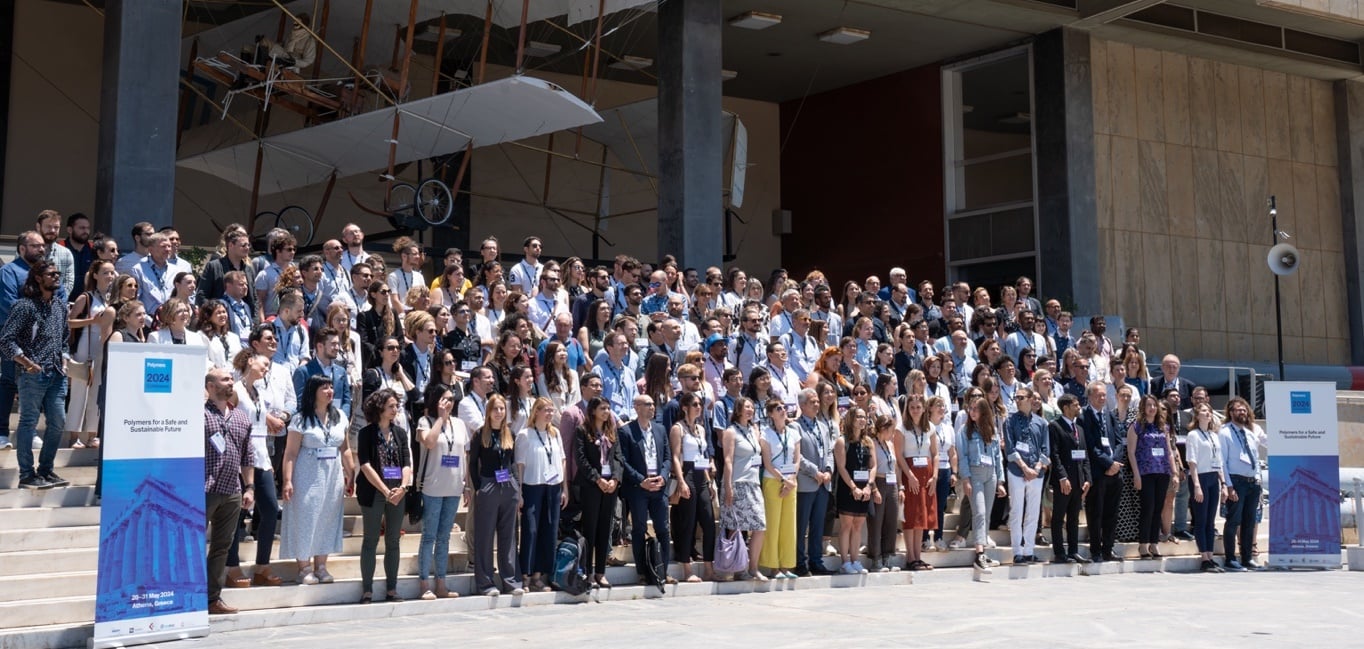
The conference featured three keynote speakers and 12 invited speakers, including esteemed scholars from Europe, Asia, Africa, and Canada. It included 60 selected talks and 189 posters, chosen by the 24 members of the Scientific Committee along with the three Conference Chairs. The event explored the latest scientific advancements and innovations in polymer science, focusing on creating safe, sustainable, and environmentally friendly materials. Emphasizing green polymer chemistry and the use of bioresources, the conference promoted the synthesis of biobased and biodegradable polymers.
The conference featured esteemed scholars from Europe, Asia, Africa, and Canada
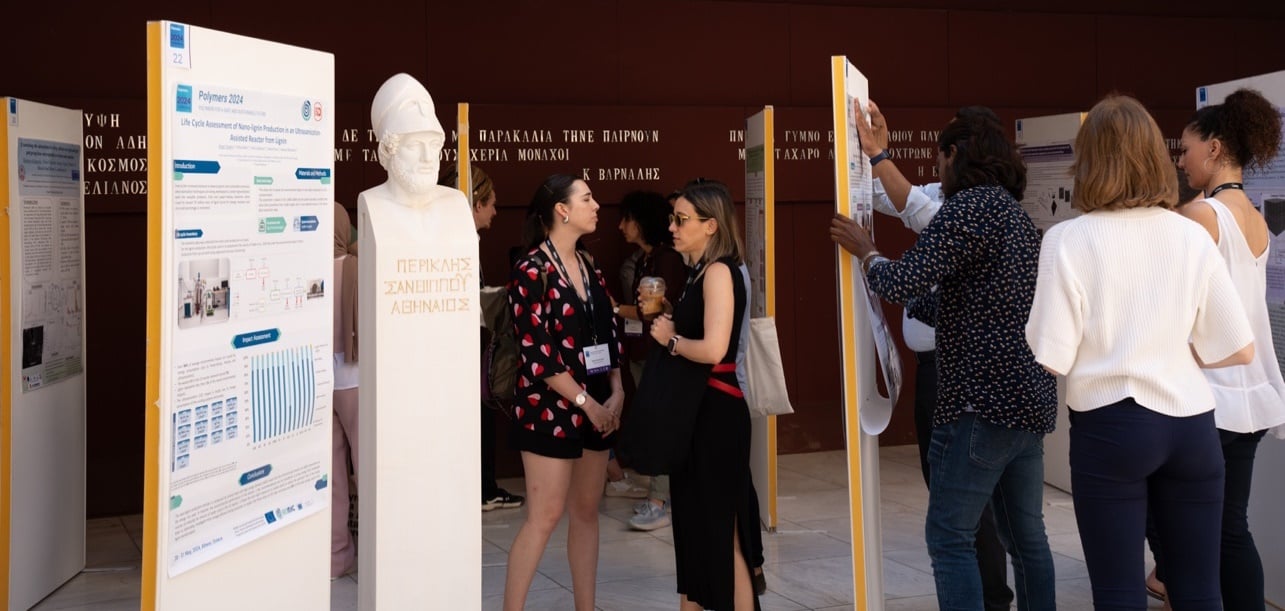
Conference awards
The conference also presented three awards: two sponsored by the journal Polymers – The Best Poster Award (€500) and the Best Oral Presentation Award (€600) – and one sponsored by Ossila, the Best Student Poster Award (€500).
Thank you to our 16 sponsors, three partnering societies (Hellenic Polymer Society, European Polymer Federation, and North American Thermal Analysis Society [NATAS]) and eight media partners.
Upcoming in-person event
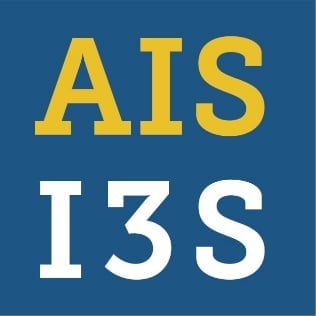
1–4 August, 2024
The 1st International Conference on AI Sensors & The 10th International Symposium on Sensor Science
Location: Singapore
The AI Sensors 2024 Conference will unite innovators and experts in the realms of sensors, sensing technology, and artificial intelligence.
Find more upcoming MDPI events here.
Closing Thoughts
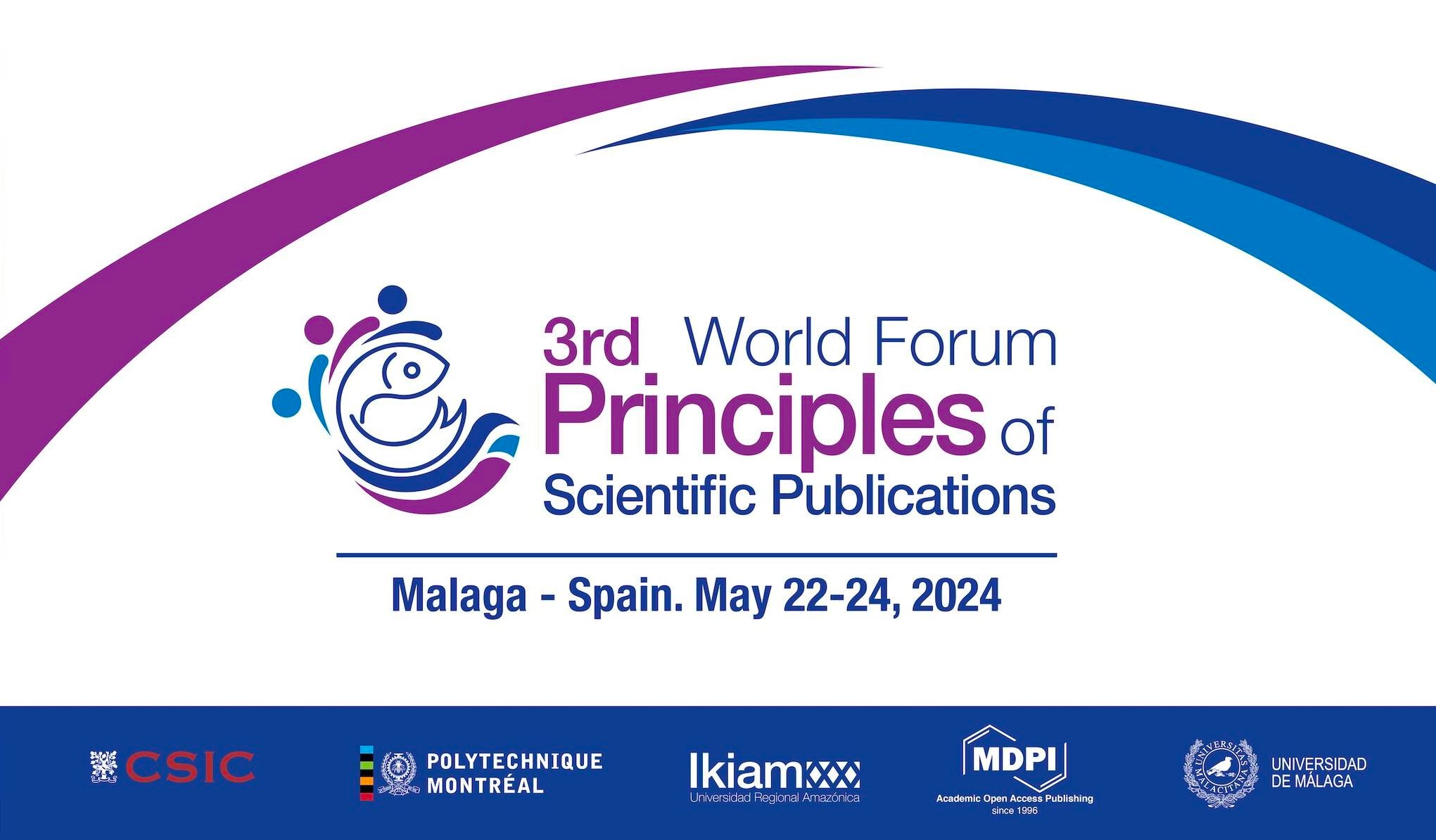
3rd World Forum Principles of Scientific Publications
I’m pleased to share that MDPI sponsored and attended the 3rd World Forum on Principles of Scientific Publications, which took place from 22–24 May in Malaga, Spain. The event brought together academic professionals and leading researchers to discuss critical topics in the realm of publishing and research. Presentation topics included Open Science, AI in Publishing, Predatory Journals, Fake Publications, Challenges for Non-native English Speakers, and more.
“It was great to see strong support from MDPI authors in the audience”
MDPI presentations
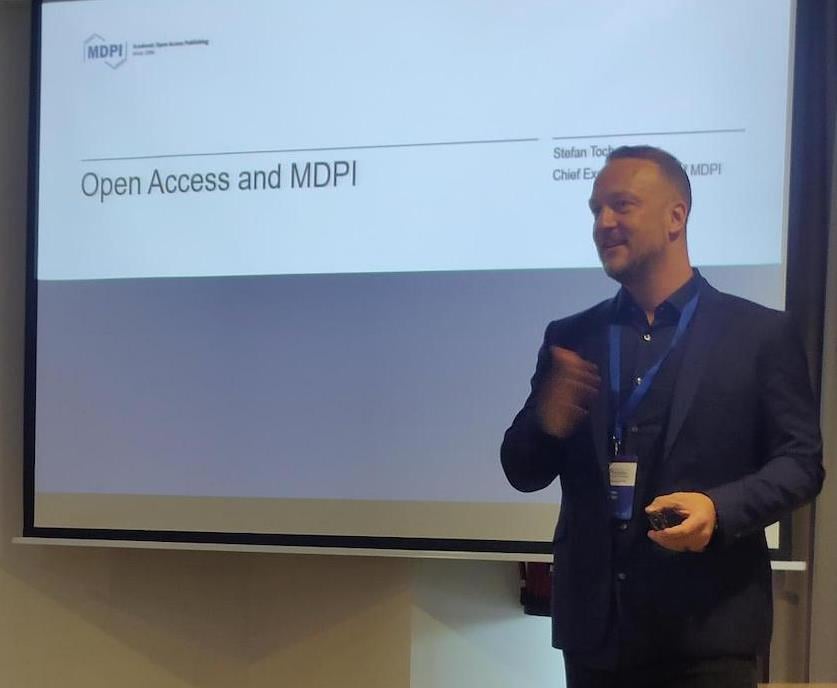
Stefan Tochev (CEO, MDPI) presenting at the 3rd World Forum Principles of Scientific Publications
I had the privilege of attending and presenting at the event, along with my colleague Dr. Enric Sayas (Business Analyst, MDPI) from our Barcelona office, who explored the ethical concerns and opportunities brought by AI in publishing.
I took the opportunity to present on Open Science, the benefits of Open Access, and MDPI’s performance, operations, and investment in ethics. Special thanks to Evan Escamilla (Project Manager, MDPI Books) and Facundo Santomé (Sr. Marketing Manager, MDPI) who also joined the conference.
It was great to see strong support from MDPI authors in the audience who shared their positive experiences publishing with us. Their story reflects the experience of the vast majority of authors who choose to work with MDPI.
We also encountered some conservative views on OA, which created an opportunity for open discussion aimed at addressing concerns about OA and MDPI. Engaging in such discussions is important, as scepticism sometimes arises from misinformation or from a misunderstanding of who we are and how we operate. When we engage in open and honest discussion, we tend to see people getting a better understanding of MDPI, which helps address any misconceptions they may have had.
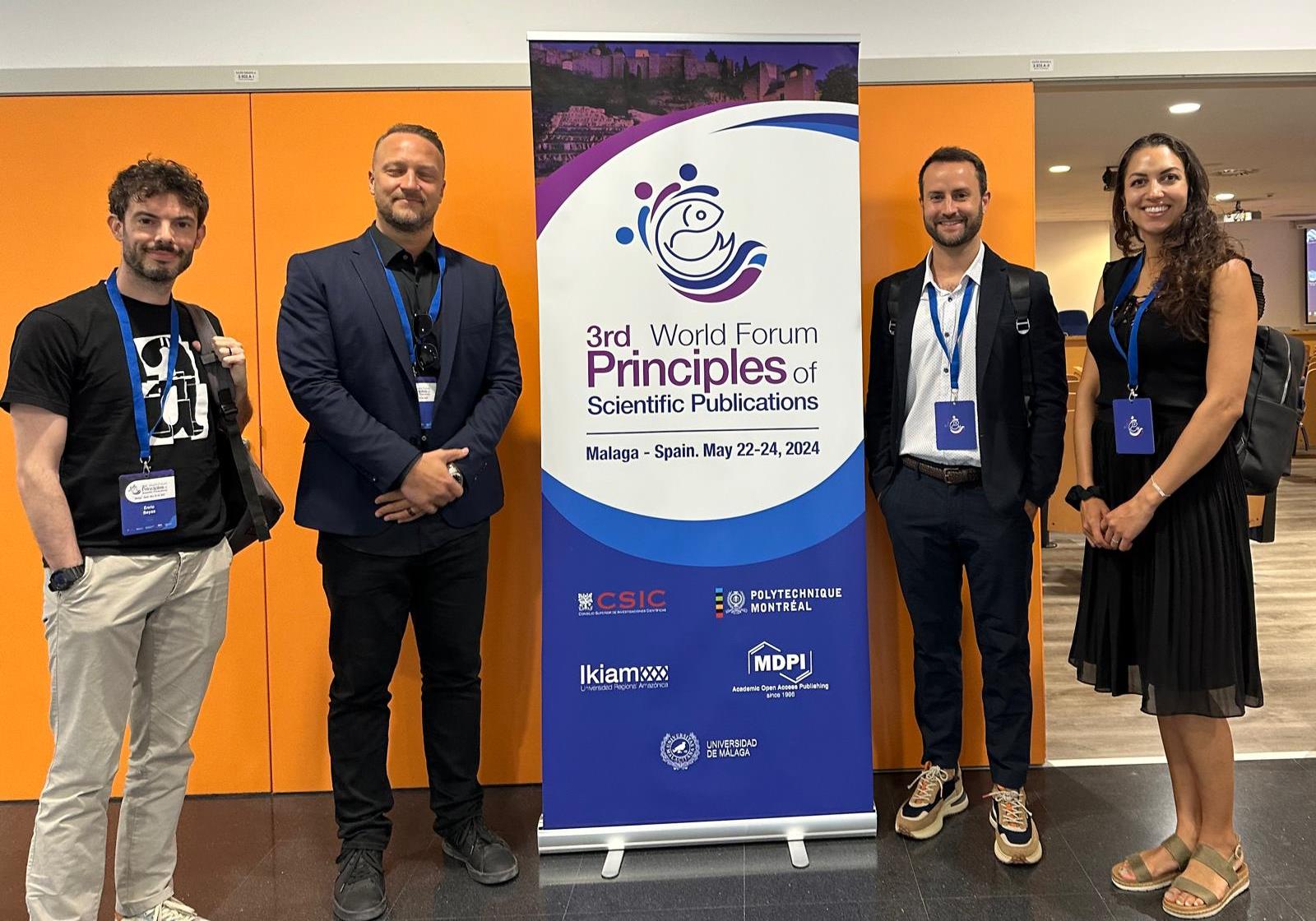
Left to right: Dr. Enric Sayas (Business Analyst, MDPI), Stefan Tochev (CEO, MDPI), Facundo Santomé (Sr. Marketing Manager, MDPI), and Evan Escamilla (Project Manager, MDPI Books) at 3rd World Forum Principles of Scientific Publications
Chief Executive Officer
MDPI AG
28 May 2024
Pharmaceutics | Selected Papers in 2023 in the Section “Nanomedicine and Nanotechnology”

1. “Electrosprayed Core (Cellulose Acetate)–Shell (Polyvinylpyrrolidone) Nanoparticles for Smart Acetaminophen Delivery”
by Lin Xu, Hua He, Yutong Du, Shengwei Zhang, Deng-Guang Yu and Ping Liu
Pharmaceutics 2023, 15(9), 2314; https://doi.org/10.3390/pharmaceutics15092314
Available online: https://www.mdpi.com/1999-4923/15/9/2314
2. “ZnO@ZIF-8 Nanoparticles as Nanocarrier of Ciprofloxacin for Antimicrobial Activity”
by Bruno Altran Costa, Marina Paiva Abuçafy, Thúlio Wliandon Lemos Barbosa, Bruna Lallo da Silva, Rafael Bianchini Fulindi, Guilherme Isquibola, Paulo Inácio da Costa and Leila Aparecida Chiavacci
Pharmaceutics 2023, 15(1), 259; https://doi.org/10.3390/pharmaceutics15010259
Available online: https://www.mdpi.com/1999-4923/15/1/259
3. “Liposomal Iron Oxide Nanoparticles Loaded with Doxorubicin for Combined Chemo-Photothermal Cancer Therapy”
by Taehoon Park, Reeju Amatya, Kyoung Ah Min and Meong Cheol Shin
Pharmaceutics 2023, 15(1), 292; https://doi.org/10.3390/pharmaceutics15010292
Available online: https://www.mdpi.com/1999-4923/15/1/292
4. “Increasing Bioavailability of Trans-Ferulic Acid by Encapsulation in Functionalized Mesoporous Silica”
by Gabriela Petrișor, Ludmila Motelica, Denisa Ficai, Cornelia-Ioana Ilie, Roxana Doina Trușcǎ, Vasile-Adrian Surdu, Ovidiu-Cristian Oprea, Andreea-Luiza Mȋrț, Gabriel Vasilievici, Augustin Semenescu et al.
Pharmaceutics 2023, 15(2), 660; https://doi.org/10.3390/pharmaceutics15020660
Available online: https://www.mdpi.com/1999-4923/15/2/660
5. “Effect of the Size and Shape of Dendronized Iron Oxide Nanoparticles Bearing a Targeting Ligand on MRI, Magnetic Hyperthermia, and Photothermia Properties—From Suspension to In Vitro Studies”
by Barbara Freis, Maria De Los Angeles Ramirez, Céline Kiefer, Sébastien Harlepp, Cristian Iacovita, Céline Henoumont, Christine Affolter-Zbaraszczuk, Florent Meyer, Damien Mertz, Anne Boos et al.
Pharmaceutics 2023, 15(4), 1104; https://doi.org/10.3390/pharmaceutics15041104
Available online: https://www.mdpi.com/1999-4923/15/4/1104
6. “Antimicrobial Nano-Zinc Oxide Biocomposites for Wound Healing Applications: A Review”
by Paolo Pino, Francesca Bosco, Chiara Mollea and Barbara Onida
Pharmaceutics 2023, 15(3), 970; https://doi.org/10.3390/pharmaceutics15030970
Available online: https://www.mdpi.com/1999-4923/15/3/970
7. “Cationic Polymers as Transfection Reagents for Nucleic Acid Delivery”
by Xiaomeng Cai, Rui Dou, Chen Guo, Jiaruo Tang, Xiajuan Li, Jun Chen and Jiayu Zhang
Pharmaceutics 2023, 15(5), 1502; https://doi.org/10.3390/pharmaceutics15051502
Available online: https://www.mdpi.com/1999-4923/15/5/1502
8. “Superparamagnetic Iron Oxide Nanoparticles (SPION): From Fundamentals to State-of-the-Art Innovative Applications for Cancer Therapy”
by Thomas Vangijzegem, Valentin Lecomte, Indiana Ternad, Levy Van Leuven, Robert N. Muller, Dimitri Stanicki and Sophie Laurent
Pharmaceutics 2023, 15(1), 236; https://doi.org/10.3390/pharmaceutics15010236
Available online: https://www.mdpi.com/1999-4923/15/1/236
9. “Chitosan-Based Nanoparticles with Optimized Parameters for Targeted Delivery of a Specific Anticancer Drug—A Comprehensive Review”
by Joanna Kurczewska
Pharmaceutics 2023, 15(2), 503; https://doi.org/10.3390/pharmaceutics15020503
Available online: https://www.mdpi.com/1999-4923/15/2/503
10. “Carbon Dots: Opportunities and Challenges in Cancer Therapy”
by Tanima Bhattacharya, Gye Hwa Shin and Jun Tae Kim
Pharmaceutics 2023, 15(3), 1981; https://doi.org/10.3390/pharmaceutics13111981
Available online: https://www.mdpi.com/1999-4923/13/11/1981
28 May 2024
Pharmaceutics | Selected Papers in 2023 in the Section “Drug Delivery and Controlled Release”

1. “Advances in Oral Drug Delivery Systems: Challenges and Opportunities”
by Jie Lou, Hongli Duan, Qin Qin, Zhipeng Teng, Fengxu Gan, Xiaofang Zhou and Xing Zhou
Pharmaceutics 2023, 15(2), 484; https://doi.org/10.3390/pharmaceutics15020484
Available online: https://www.mdpi.com/1999-4923/15/2/484
2. “Drug Delivery Systems in Regenerative Medicine: An Updated Review”
by Alaa Mansour, Maya Romani, Anirudh Balakrishna Acharya, Betul Rahman, Elise Verron and Zahi Badran
Pharmaceutics 2023, 15(2), 695; https://doi.org/10.3390/pharmaceutics15020695
Available online: https://www.mdpi.com/1999-4923/15/2/695
3. “Lipid Nanoparticles Functionalized with Antibodies for Anticancer Drug Therapy”
by Ana Camila Marques, Paulo C. Costa, Sérgia Velho and Maria Helena Amaral
Pharmaceutics 2023, 15(1), 216; https://doi.org/10.3390/pharmaceutics15010216
Available online: https://www.mdpi.com/1999-4923/15/1/216
4. “Current Trends in Gelatin-Based Drug Delivery Systems”
by Francesca Milano, Annalia Masi, Marta Madaghiele, Alessandro Sannino, Luca Salvatore and Nunzia Gallo
Pharmaceutics 2023, 15(5), 1499; https://doi.org/10.3390/pharmaceutics15051499
Available online: https://www.mdpi.com/1999-4923/15/5/1499
5. “Rapidly Dissolving Microneedles for the Delivery of Steroid-Loaded Nanoparticles Intended for the Treatment of Inflammatory Skin Diseases”
by Hala Dawud and Aiman Abu Ammar
Pharmaceutics 2023, 15(2), 526; https://doi.org/10.3390/pharmaceutics15020526
Available online: https://www.mdpi.com/1999-4923/15/2/526
6. “Metal–Organic Frameworks and Their Biodegradable Composites for Controlled Delivery of Antimicrobial Drugs”
by Tayah C. Livesey, Lila A. M. Mahmoud, Maria G. Katsikogianni and Sanjit Nayak
Pharmaceutics 2023, 15(1), 274; https://doi.org/10.3390/pharmaceutics15010274
Available online: https://www.mdpi.com/1999-4923/15/1/274
7. “Controlled Drug Release from Nanoengineered Polysaccharides”
by Ilker S. Bayer
Pharmaceutics 2023, 15(5), 1364; https://doi.org/10.3390/pharmaceutics15051364
Available online: https://www.mdpi.com/1999-4923/15/5/1364
8. “Plant-Derived Extracellular Vesicles as a Delivery Platform for RNA-Based Vaccine: Feasibility Study of an Oral and Intranasal SARS-CoV-2 Vaccine”
by Margherita A. C. Pomatto, Chiara Gai, Federica Negro, Lucia Massari, Maria Chiara Deregibus, Cristina Grange, Francesco Giuseppe De Rosa and Giovanni Camussi
Pharmaceutics 2023, 15(3), 974; https://doi.org/10.3390/pharmaceutics15030974
Available online: https://www.mdpi.com/1999-4923/15/3/974
9. “Biodistribution of Intratracheal, Intranasal, and Intravenous Injections of Human Mesenchymal Stromal Cell-Derived Extracellular Vesicles in a Mouse Model for Drug Delivery Studies”
by Anna Maria Tolomeo, Gaia Zuccolotto, Ricardo Malvicini, Giada De Lazzari, Alessandro Penna, Chiara Franco, Federico Caicci, Fabio Magarotto, Santina Quarta, Michela Pozzobon et al.
Pharmaceutics 2023, 15(2), 548; https://doi.org/10.3390/pharmaceutics15020548
Available online: https://www.mdpi.com/1999-4923/15/2/548
10. “Polysarcosine-Functionalized mRNA Lipid Nanoparticles Tailored for Immunotherapy”
by Christoph Wilhelmy, Isabell Sofia Keil, Lukas Uebbing, Martin A. Schroer, Daniel Franke, Thomas Nawroth, Matthias Barz, Ugur Sahin, Heinrich Haas, Mustafa Diken et al.
Pharmaceutics 2023, 15(8), 2068; https://doi.org/10.3390/pharmaceutics15082068
Available online: https://www.mdpi.com/1999-4923/15/8/2068
11. “Low-Level Laser Treatment Induces the Blood-Brain Barrier Opening and the Brain Drainage System Activation: Delivery of Liposomes into Mouse Glioblastoma”
by Oxana Semyachkina-Glushkovskaya, Denis Bragin, Olga Bragina, Sergey Socolovski, Alexander Shirokov, Ivan Fedosov, Vasily Ageev, Inna Blokhina, Alexander Dubrovsky, Valeria Telnova et al.
Pharmaceutics 2023, 15(2), 567; https://doi.org/10.3390/pharmaceutics15020567
Available online: https://www.mdpi.com/1999-4923/15/2/567
12. “Amorphous Pterostilbene Delivery Systems Preparation—Innovative Approach to Preparation Optimization”
by Natalia Rosiak, Ewa Tykarska and Judyta Cielecka-Piontek
Pharmaceutics 2023, 15(4), 1231; https://doi.org/10.3390/pharmaceutics15041231
Available online: https://www.mdpi.com/1999-4923/15/4/1231
23 May 2024
Transfer Service in MDPI
We are pleased to announce MDPI’s Transfer Service.
This service provides a convenient method of transferring your manuscript file, along with any reviewer comments, to another journal within our publishing portfolio.
We are committed to helping authors find the right home for their research, and we will provide authors with guidance and technical support through all stages of the transfer process. Authors will be able to choose to transfer in the following two situations:
1. Select alternative journals on submission.
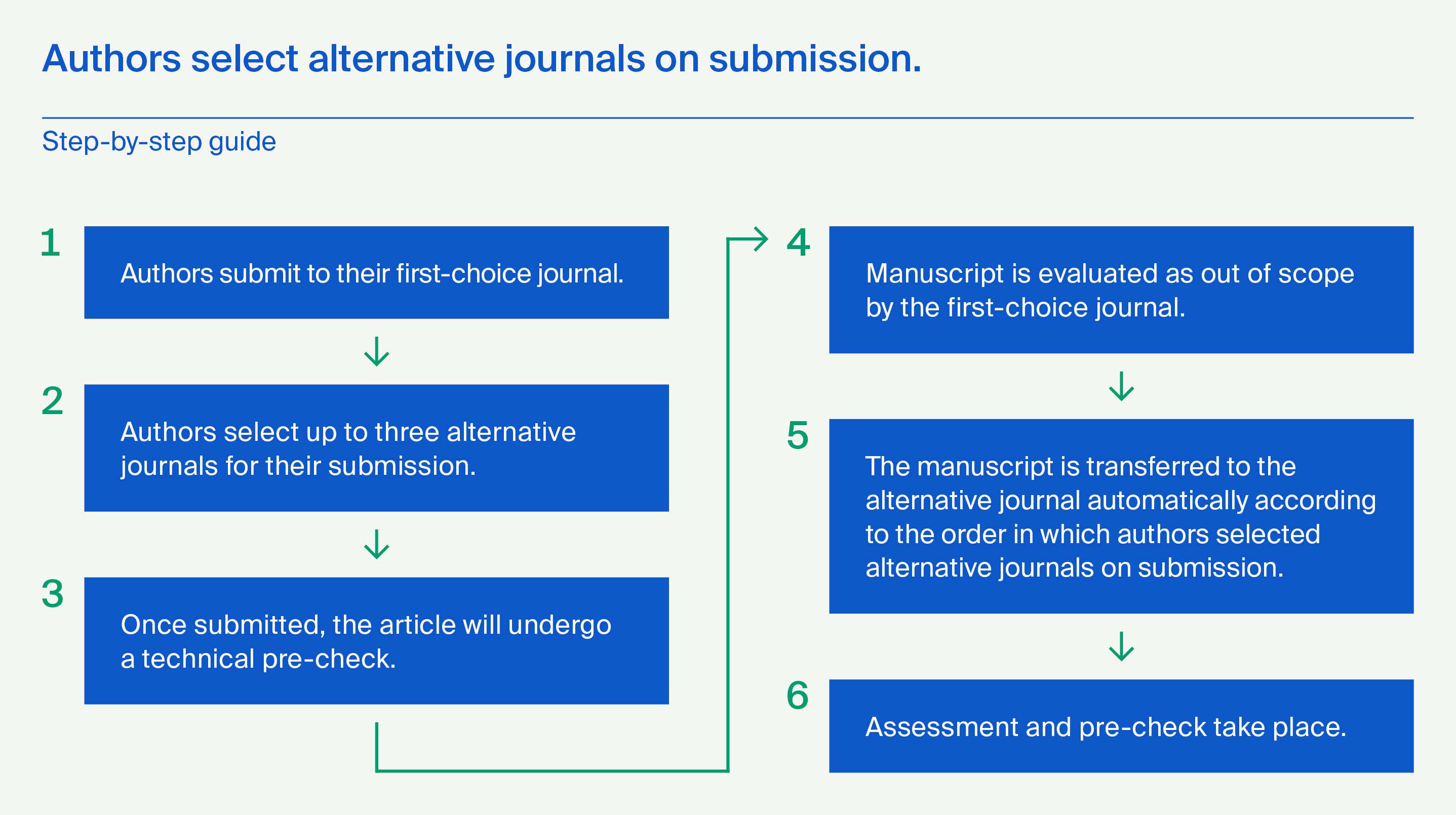
2. Authors are encouraged to transfer manuscripts to other MDPI journals.
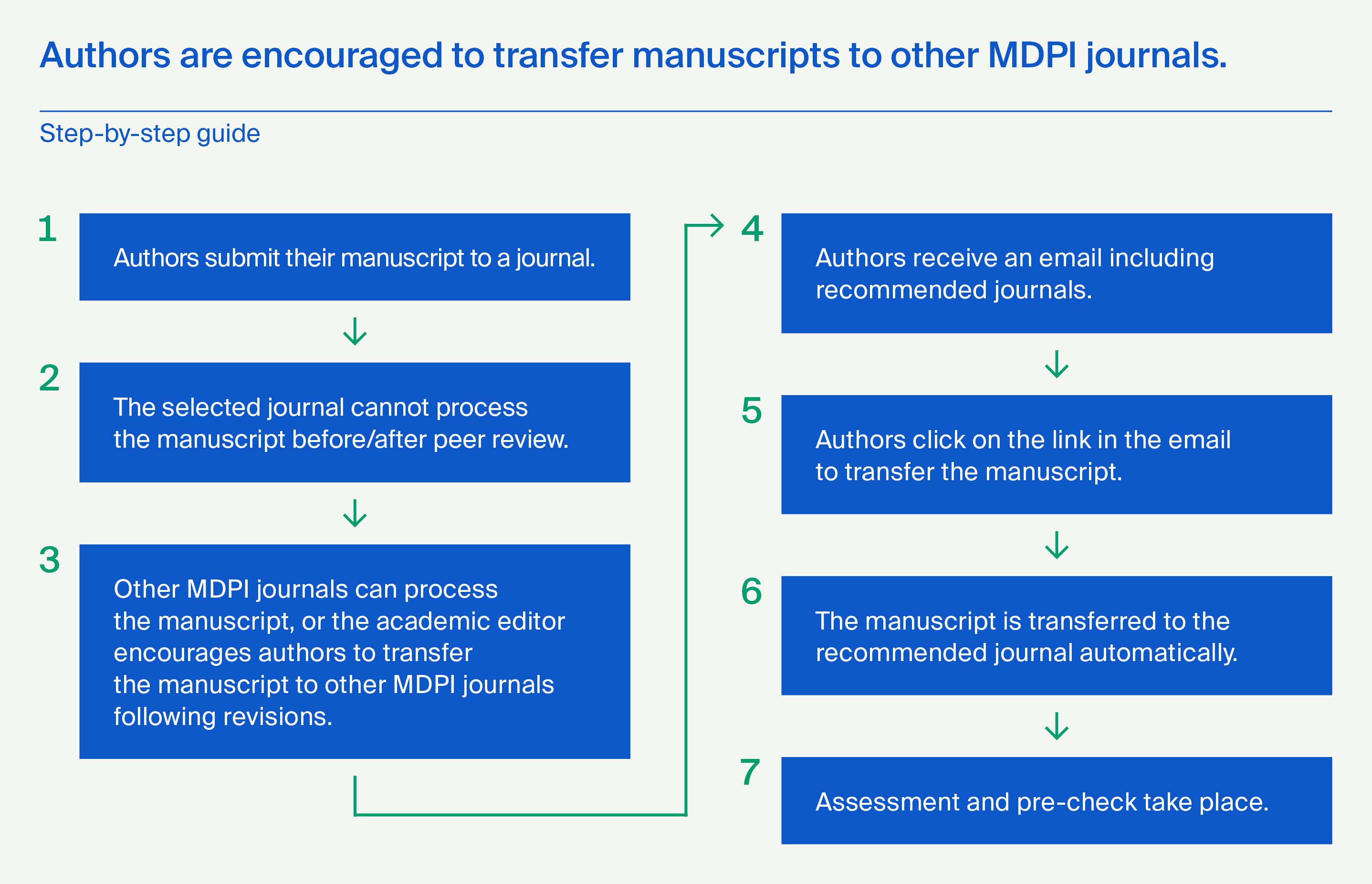
More details about the Transfer Service can be found at the following link:
21 May 2024
Prof. Dr. Francisco Javier Otero-Espinar Appointed Section Editor-in-Chief of Section “Drug Delivery and Controlled Release” in Pharmaceutics

We are pleased to announce that Prof. Dr. Francisco Javier Otero-Espinar has been appointed Section Editor-in-Chief of the “Drug Delivery and Controlled Release” Section in Pharmaceutics (ISSN: 1999-4923). With an extensive background in scientific research and publishing, he will bring a wealth of knowledge and expertise to this prestigious role.
Prof. Dr. Francisco Javier Otero-Espinar is a pharmacist and a pharmaceutical scientist at the Faculty of Pharmacy, at the University of Santiago de Compostela, Spain. He is a member of the Institute of Materials (iMATUS) and the Health Research Institute (IDIS) of Santiago de Compostela. His scientific endeavors primarily focus on biopharmaceutics, pharmacokinetics, and pharmaceutical technology. He specializes in the development of drug-controlled release systems for various routes of administration, including oral, parenteral, dermal, ophthalmic, and others. Additionally, he works on the development of release systems for biological drugs and their physicochemical, biopharmaceutical, and pharmacokinetic characterization.
He is a Fellow of the Spanish Society of Industrial and Galenical Pharmacy (SEFIG), where he served as a Secretary and later, President. Additionally, he is a member of the Spanish–Portuguese CRS local chapter and various networks associated with controlled release and nanomedicine. Formerly, he has served as the Dean of the Faculty of Pharmacy in Santiago de Compostela and, presently, coordinates the research group PARAQUASIL.
Throughout his career, he has actively engaged in projects and contracts with the pharmaceutical industry, accumulating substantial experience in technology transfer and knowledge dissemination to the public and private sector.
The following is a short Q&A with Prof. Dr. Francisco Javier Otero-Espinar, who shared his vision for the journal with us, as well as his views on the research area and open access publishing:
1. What appealed to you about the journal that made you want to become its Section Editor-in-Chief?
I have been involved in Pharmaceutics for several years, serving as a member of its Editorial Board. Pharmaceutics aligns closely with my scientific interests, and I have consistently encountered highly interesting and high-quality articles and papers that have supported my research endeavors.
2. What are your plans and vision for the journal?
I believe that Pharmaceutics should persist in publishing high-quality articles concerning pharmaceutical development, biopharmaceutics, pharmaceutical technology, and pharmacology. Specifically, the advancement of novel dosage forms and controlled drug release mechanisms should be prioritized. To this end, I intend to collaborate in attracting top scientists working in these fields to consider Pharmaceutics as a prime outlet for disseminating their research.
3. What does the future of this field of research look like?
New drug discovery is becoming progressively more expensive, thus highlighting the significant potential of specialized controlled release systems to enhance current treatments. Conversely, the emergence of new biological drugs has fundamentally altered the principles governing the design, formulation, and regulation of delivery systems for these molecules. This represents an emerging field necessitating a fresh perspective in research methodologies.
4. What do you think of the development of open access literature in the publishing field?
Open access publications have significantly broadened access to information for numerous scientists and laboratories, thereby facilitating the dissemination of knowledge. However, a challenge arises for scientists and organizations lacking the financial resources to afford open access publication fees. In such cases, the initiatives of certain journals to waive or reduce publication costs are greatly valued. It is also very important to maintain a high ethical standard of open access publications to ensure the quality and interest of researchers in this type of publication model.
We warmly welcome Prof. Dr. Francisco Javier Otero-Espinar as the Section Editor-in-Chief of “Drug Delivery and Controlled Release” and look forward to his contribution to the continued success of the journal.
17 May 2024
Prof. Dr. Dimitrios A. Lamprou Appointed Section Editor-in-Chief of Section “Physical Pharmacy and Formulation” in Pharmaceutics

We are pleased to announce that Prof. Dr. Dimitrios A. Lamprou has been appointed Section Editor-in-Chief of the Section “Physical Pharmacy and Formulation” in Pharmaceutics (ISSN: 1999-4923). With his extensive background in scientific research and publishing, he will bring a wealth of knowledge and expertise to this prestigious role.
Prof. Dr. Dimitrios A. Lamprou (Ph.D., MBA) is the Chair of Biofabrication and Advanced Manufacturing, and Director of MSc Industrial Pharmaceutics at Queen's University Belfast, UK. He is also the Chair of the United Kingdom and Ireland Controlled Release Society (UKICRS). Moreover, he is an expert in emerging biopharmaceutical and pharmaceutical technologies, with over 160 peer-reviewed publications and over 450 conference abstracts, and has delivered over 180 invited talks at institutions and conferences across the world.
Prof. Dr. Lamprou is a recognized world leader in 3D printing and microfluidics, with PubMed-based algorithms placing him in the top 0.1% of scholars writing about 3D printing and in the top 0.07% of scholars writing about microfluidics over the past 10 years. He has also been named in Stanford University's list of the World's Top 2% Scientists for several consecutive years thanks to his research on pharmaceutics and biomedical engineering. His research and academic leadership have been recognized through a range of awards, including the Royal Pharmaceutical Society (RPS) Science Award, the Scottish Universities Life Sciences Alliance (SULSA) Leaders Scheme Award, and Doctor Honoris Causa Award by Semmelweis University (Hungary). More info can be found at www.emergingtechnologieslab.com.
The following is a short Q&A with Prof. Dr. Dimitrios A. Lamprou, who shared his vision for the journal with us, as well as his views on the research area and open access publishing:
1. What appealed to you about the journal that made you want to become its Section Editor-in-Chief?
I am very familiar with the journal as I have been serving as an editor of Pharmaceutics for many years, checking 50+ papers, editing 10+ Special Issues, and organizing two successful webinars. With this appointment, I will be able to further support the journal, weed out low-quality contributions, guarantee the caliber of the articles that are published, and, at the same time, boost the topic.
2. What are your plans and vision for the journal?
“Physical Pharmacy and Formulation” examines the physicochemical properties of liquid and semi-solid pharmaceutical dosage forms to deliver an active pharmaceutical ingredient (API), and the research on the topic is crucial in drug discovery research for new molecules and excipient development. The topic is also very important for the development of safer drug delivery systems (DDSs) for future medicines. The main vision of this open access section is to make this important research more visual to researchers in the field by bringing fundamental and advanced research to them, supporting the development of advanced DDSs.
3. What does the future of this field of research look like?
This field was always very important and a hot topic. To keep the rise in research with coherent and strong manuscripts, we must make sure that new Special Issues are introduced with improved standards and selectivity. The topic to be developed needs high-quality manuscripts, and to achieve this there need to be strict regulations and higher standards.
4. What do you think of the development of open access literature in the publishing field?
Currently, the majority of traditionally subscription-based journals offer open access as an option, which is great since research must be available to everyone. For journals that are offering only open access, there needs to be a focus on the quality of the manuscripts. There are so many open access journals these days, with more advertised every day; therefore, one needs to be continuously creative and strictly monitor and uphold publishing ethics.
We warmly welcome Prof. Dr. Dimitrios A. Lamprou as the Section Editor-in-Chief of “Physical Pharmacy and Formulation” and look forward to his contribution to the continued success of the journal.
17 May 2024
Tu Youyou Award—Open for Nominations
In acknowledgment of the groundbreaking achievements of Professor Tu Youyou, the Nobel laureate credited with the discovery of artemisinin, MDPI is proud to announce the Tu Youyou Award. This award, inaugurated in 2016, seeks to honor scholars who excel in the fields of natural products chemistry and medicinal chemistry.
Prize:
- CHF 100,000 in total (If there is more than one winner, the prize will be divided equally amongst the winners);
- An award medal for each winner.
Who should be nominated?
- Scientists with outstanding achievements and contributions in the fields of natural products chemistry and medicinal chemistry.
Who can submit a nomination?
- Academic research institutes
- Universities
- Academic societies
Any personal nominations are not accepted.
How do I submit a nomination?
Candidates’ institutional affiliations need to submit their nominations for final candidates to the Tu Youyou Award Team directly by email after internal screening, and each institution can only nominate a maximum of two candidates for each edition of the Tu Youyou Award. Please note that the nominations cannot be modified once they are submitted and confirmed by the Tu Youyou Award Team.
Required nomination materials:
Nomination Form (Download)
Schedule:
Nomination deadline: 31 December 2024;
Winner announcement: 30 April 2025.
Contact:
Tu Youyou Award Team (tuyouyouaward@mdpi.com)
More information can be found on the Tu Youyou Award official website. For any inquiries, do not hesitate to contact the Tu Youyou Award Team.




